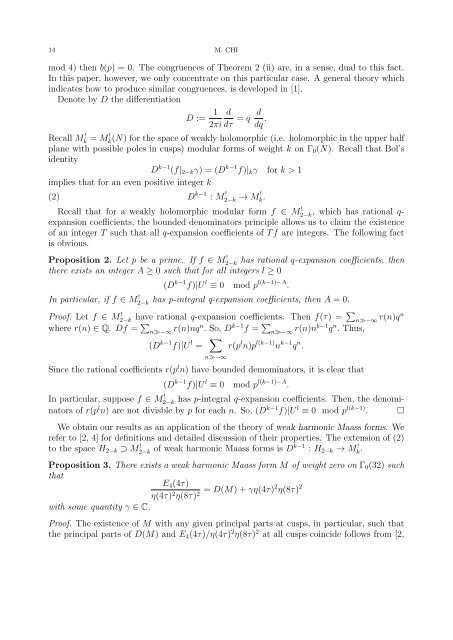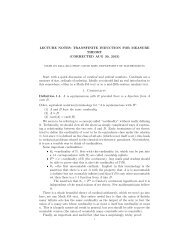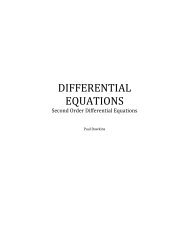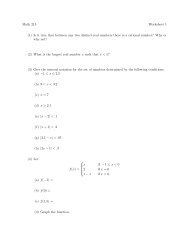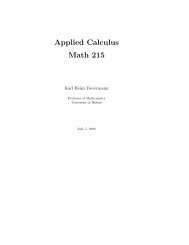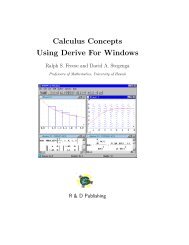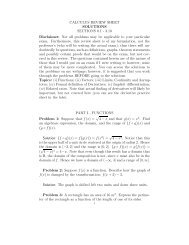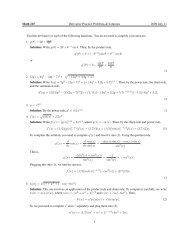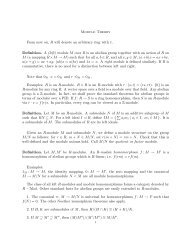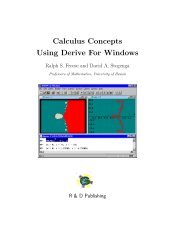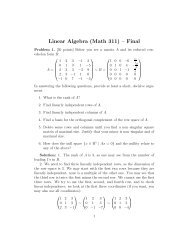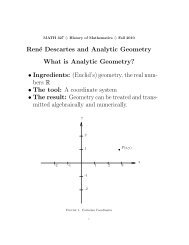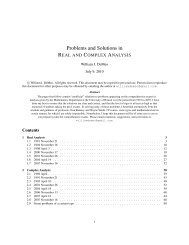MA thesis available - University of Hawaii
MA thesis available - University of Hawaii
MA thesis available - University of Hawaii
Create successful ePaper yourself
Turn your PDF publications into a flip-book with our unique Google optimized e-Paper software.
14 M. CHI<br />
mod 4) then b(p) = 0. The congruences <strong>of</strong> Theorem 2 (ii) are, in a sense, dual to this fact.<br />
In this paper, however, we only concentrate on this particular case. A general theory which<br />
indicates how to produce similar congruences, is developed in [1].<br />
Denote by D the differentiation<br />
D := 1 d d<br />
= q<br />
2πi dτ dq .<br />
Recall M ! k = M ! k (N) for the space <strong>of</strong> weakly holomorphic (i.e. holomorphic in the upper half<br />
plane with possible poles in cusps) modular forms <strong>of</strong> weight k on Γ0(N). Recall that Bol’s<br />
identity<br />
D k−1 (f|2−kγ) = (D k−1 f)|kγ for k > 1<br />
implies that for an even positive integer k<br />
(2) D k−1 : M ! 2−k → M ! k.<br />
Recall that for a weakly holomorphic modular form f ∈ M ! 2−k , which has rational qexpansion<br />
coefficients, the bounded denominators principle allows us to claim the existence<br />
<strong>of</strong> an integer T such that all q-expansion coefficients <strong>of</strong> T f are integers. The following fact<br />
is obvious.<br />
Proposition 2. Let p be a prime. If f ∈ M ! 2−k has rational q-expansion coefficients, then<br />
there exists an integer A ≥ 0 such that for all integers l ≥ 0<br />
(D k−1 f)|U l ≡ 0 mod p l(k−1)−A .<br />
In particular, if f ∈ M ! 2−k has p-integral q-expansion coefficients, then A = 0.<br />
Pro<strong>of</strong>. Let f ∈ M ! <br />
2−k have rational q-expansion coefficients. Then f(τ) = n≫−∞ r(n)qn<br />
where r(n) ∈ Q. Df = <br />
n≫−∞ r(n)nqn . So, Dk−1f = <br />
n≫−∞ r(n)nk−1qn . Thus,<br />
(D k−1 f)|U l = <br />
n≫−∞<br />
r(p l n)p l(k−1) n k−1 q n .<br />
Since the rational coefficients r(p l n) have bounded demominators, it is clear that<br />
(D k−1 f)|U l ≡ 0 mod p l(k−1)−A .<br />
In particular, suppose f ∈ M ! 2−k has p-integral q-expansion coefficients. Then, the denominators<br />
<strong>of</strong> r(pln) are not divisble by p for each n. So, (Dk−1f)|U l ≡ 0 mod pl(k−1) . <br />
We obtain our results as an application <strong>of</strong> the theory <strong>of</strong> weak harmonic Maass forms. We<br />
refer to [2, 4] for definitions and detailed discussion <strong>of</strong> their properties. The extension <strong>of</strong> (2)<br />
to the space H2−k ⊃ M ! 2−k <strong>of</strong> weak harmonic Maass forms is Dk−1 : H2−k → M ! k .<br />
Proposition 3. There exists a weak harmonic Maass form M <strong>of</strong> weight zero on Γ0(32) such<br />
that<br />
E4(4τ)<br />
η(4τ) 2 η(8τ) 2 = D(M) + γη(4τ)2 η(8τ) 2<br />
with some quantity γ ∈ C.<br />
Pro<strong>of</strong>. The existence <strong>of</strong> M with any given principal parts at cusps, in particular, such that<br />
the principal parts <strong>of</strong> D(M) and E4(4τ)/η(4τ) 2 η(8τ) 2 at all cusps coincide follows from [2,


